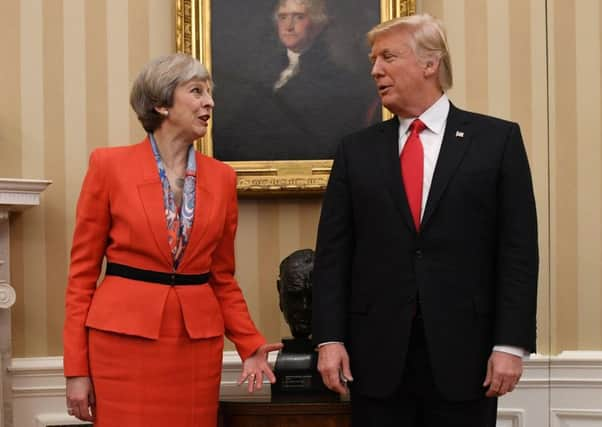Bill Jamieson reflects on an eventful year for investors


Abroad, America’s new president Donald Trump fired key White House staff at will and kept the world’s news agencies on alert for his nocturnal abrasive tweets; rogue state North Korea continued with nuclear tests in the face of global condemnation; London and continental Europe suffered deadly terror attacks; Middle East tensions rose; Russia was accused of electronic subterfuge in US and European politics; Germany’s Angela Merkel had to fight for her political life; Spain faced a constitutional break-up; and sex scandals scythed through leading figures in show business and politics.
And as if all this was not enough, the Bank of England raised interest rates for the first time in nine years and a Budget towards the end of the year left the UK looking out to five years of barely perceptible economic growth.
Advertisement
Hide AdAdvertisement
Hide AdWho would dare to invest in 2017? Surely markets would have retreated as investors sought safety in fixed interest savings – or simply cash?
Yet as the year-end approached, investors could scarcely believe their luck. As Christmas celebrations got under way, the FTSE 100 index was standing 13 per cent above its level a year earlier. And the FTSE World Index was more than 15 per cent higher.
Nor was this buoyancy confined to the globe-straddling corporate behemoths. The FTSE 250 Index, largely consisting of medium-sized UK domestic-facing companies was standing 14 per cent higher than its level in January.
By contrast, “safe haven” investments put on a lame performance. UK corporate bonds were a modest 6.7 per cent up on their level in November 2016. Gilt edged stocks were just 3.7 per cent higher.
What accounted for this counter-intuitive performance? Why should markets have risen, given all the turbulence, and when investors have every reason to stay away?
First, the world economy enjoyed accelerating growth. The International Monetary Fund has forecast global output growth of 3.5 per cent this year and 3.6 per cent next.
It revised up its growth forecasts for Japan and especially for the euro area. Germany is now enjoying an outstanding growth spurt, with companies struggling to keep up with demand. Projections for China were also revised up. Here at home, the FTSE 100 was buoyed by strong performances by the FANGs – Facebook, Amazon, Netflix and Google.
For investors who favour investment trusts over individual shares, the Association of Investment Companies’ best performing sector in 2017 was tech, media and telecom, with a powerful gain of 47 per cent.
Advertisement
Hide AdAdvertisement
Hide AdOutstanding here was Baillie Gifford’s Scottish Mortgage Trust, heavily exposed to FANG stocks and digital economy leaders. Shares in this trust rose 47 per cent over 2017.
Other top performing investment trust sectors included Japanese smaller companies (up 47 per cent), European smaller companies (45 per cent) and trusts specialising in property shares – the sector here is showing a 38 per cent gain across 2017.
There were fears in the immediate aftermath of the 2016 EU referendum that the domestic economy would slow markedly, unemployment would rise and smaller companies would struggle. But while the pace of growth did slow, the worst apprehensions were not realised.
In fact, smaller company trusts and funds featured among the top performers.
Standard Life’s UK Smaller Companies Investment Trust is up 40 per cent over the year, while Aberdeen Smaller Companies Income gained 55 per cent and Dunedin Enterprise Trust jumped 57 per cent.
The giant Dundee-based Alliance Trust, subject of a major management change this year, rallied by 30 per cent.
And even the beleaguered energy sector enjoyed a strong rally as the year end approached, helped by a near 30 per cent rise in the oil price.
Gold, however, took a holiday in 2017 with a gain in the bullion price of barely 1 per cent.
And the outlook for 2018? I’ll stick my neck out: it will be different.
This article appears in the WINTER 2017 edition of Vision Scotland. Further information about Vision Scotland here.